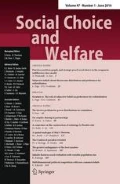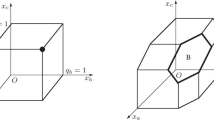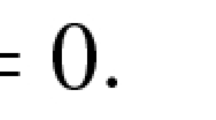Abstract
A model with a finite number of indivisible goods (houses) and the same number of individuals is considered. The allocation of houses among the individuals according to a queue order is analysed. First an allocation mechanism is constructed where it is a dominant strategy for the individuals to truthfully report their preferences. Second it is demonstrated that in order to obtain the desired allocation, the individuals must not in general report their complete ranking of the houses, but only their maximal elements in recursively defined choice sets.
Financial support from Jan Wallander's Foundation for Research in the Social Sciences is gratefully acknowledged.
Similar content being viewed by others
References
Gale D (1984): Equilibrium in a discrete exchange economy with money. Int J Game Theory 13: 61–64
Maskin ES (1987): On the fair allocation of indivisible goods. In: Arrow and the Foundations of the Theory of Public Policy, Feiwell G (ed). MacMillan Press, London, pp 343–349
Quinzii M (1984): Core and equilibria with indivisibilities. Int J Game Theory 13: 41–61
Roth AE (1982) Incentive compatibility in a market with indivisible goods. Econ Lett 9: 127–132
Shapley L, Scarf H (1974): On cores and indivisibility. J Math Econ 1: 23–37
Svensson L-G (1983): Large indivisibles — an analysis with respect to price equilibrium and fairness. Econometrica 51: 939–954
Svensson L-G (1984): Competitive equilibria with indivisible goods. J Econ 44: 373–386
Svensson L-G (1991): Nash implementation of competitive equilibria in a model with indivisible goods. Econometrica 59: 869–877
Varian HR (1974): Equity, envy and efficiency. J Econ Theory 9: 63–91
Author information
Authors and Affiliations
Rights and permissions
About this article
Cite this article
Svensson, LG. Queue allocation of indivisible goods. Soc Choice Welfare 11, 323–330 (1994). https://doi.org/10.1007/BF00183301
Received:
Accepted:
Issue Date:
DOI: https://doi.org/10.1007/BF00183301




